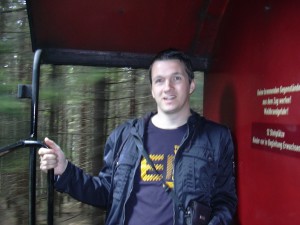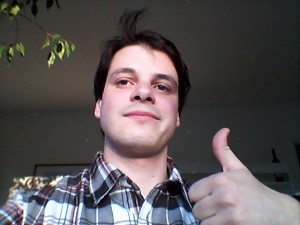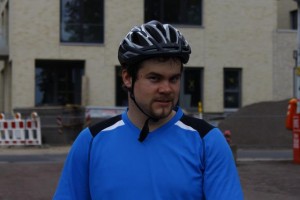Every day, as AEGEE members, we use the technology, services and applications that are available to us, ranging from browsing a website to get information about a certain Working Group, through sending emails from our aegee.org account, to asking for support when we cannot login to the Intranet. We rely on AEGEE’s IT services to provide the necessary infrastructure for our work but we barely get a chance to take a glimpse behind the scenes, and get to know those people whose invaluable work makes all of this possible. Presenting you Wim van Ravesteijn, Dilyan Palauzov and Christian Bussar, the following paragraphs will show you how working in the IT field of AEGEE can be more than a passing task, and become a source for personal development, enriching one’s life.
The AEGEEan: What are your responsibilities in AEGEE when it comes to IT matters?

Wim van Ravesteijn has been active in the ITC (formerly ITWG) for over 10 years.
Wim: “I’m responsible for the webserver Zeus, hosting almost all websites in AEGEE, as well as the Head Office servers. For Zeus, it means maintaining the server, creating new accounts, assisting users with problems, and writing some tooling to make the life of the users easier. For the Head Office, it mainly means maintaining the servers. Next to that, for 10 years already by now, I take care of the Agora and EBM applications.“
Dilyan: “In AEGEE, we use @aegee.org email addresses and mailing lists with @lists.aegee.org and I ensure that these email services are constantly up, running, and improving. This means maintaining the mail server, dealing with spam, and doing the best to deliver the emails sent to the @aegee.org addresses to the real destination mailboxes. Apart from the everyday task of creating email aliases, there are some long term ideas, like integrating the creation of the mail aliases with the intranet databases, updating software, migrating from one software to another, or installing new software for new services.”
Christian: “My task is the user support of the AEGEE Intranet, which keeps the account data of every registered AEGEE member and their position within the organisation. You need to access your account for all event applications and this is why the most demanding time is during the application period for statutory events and of course the Summer Universities. The general task is explaining people how to recover their passwords or generating interim passwords for them. The challenge of user support is being available almost every day, because naturally you don’t want to keep people waiting for longer than 24 hours.”
The AEGEEan: Most of you have been involved in this type of work for a very long time, even up to 10 years. What has kept you motivated all this time?
Wim: “Maintaining your own webserver is the dream of every IT student. You can always build your home server, but without lots of users, this is not much fun. AEGEE provides the environment to provide a reliable service to lots of people. It gives you experiences that you cannot learn from books. Finding the right balance between security and user experience is the most complicated part, but by doing it for many years, you know where is the right balance.”

One of the aims of Dilyan Palauzov is to constantly develop the email systems of AEGEE.
Dilyan: “On the one hand, there is the technical challenge, and the experience I get in this field. If you want to work in the area of IT, you need to learn a huge amount of theory, and when you apply for a job, you can list what you have learnt. AEGEE gives you the possibility both to learn theoretically and to put this in practice, for the benefit of both yourself and the organisation. On the other hand, my motivation also comes from a sense of responsibility, as I have always had the feeling, that if I do not do my work right, the rest of AEGEE will not be able to exchange emails and they will not be able to work productively.”
The AEGEEan: What are the next steps for you in these positions? Are you looking for people to get involved in your work?
Dilyan: “I’ve been in this position for too long, and I am looking for somebody to take over this challenge. Three months ago there was an open call for new members, and currently the mail team consists of Christophe, Clemens, Mateusz, Olimpia, Richard and me. The teammates do great work in answering the daily mails, but I wish there were some people to develop new software, or just make changes in the service, besides keeping the current service level. To join the mail team, experience is not at all necessary, as it can be gained along the way. What is important is the motivation and willingness to do things the right way, polished, with an attention to details. So if someone would like to learn to set up servers and email software, and is ready to ensure that the mail server is going to work non-stop, I would be glad if he or she supported me.”
Christian: “My personal situation has changed recently because I am now working full time which gives me a lot less free time than before, when I was a student. This means I don’t know exactly if it is possible for me to carry on this position for much longer. User support for the Intranet it is a quite easy task to fulfil, and you don’t need much insight into IT, just have to be able to handle an easy web form with drop down menus and check boxes. Furthermore, it is not fully about giving away positions, in fact we’re calling ourselves the myAEGEE Team, but are missing actually some faces beside me, so the first step might be to get some more people involved to share the workload, especially during the Summer University application period.”
Wim: “The next step for me in AEGEE is retirement. Well, I said that some years ago already. My involvement in AEGEE is little right now. I’ve joined Les Anciens already some years ago, that was when I left my position in the board of AEGEE-Academy. That was basically the last involvement from my side in AEGEE, except for the IT work.”
The AEGEEan: In AEGEE you work in the IT field, but what do you do in your everyday life?
Wim: “Over three years ago, I started working in an IT company in Deventer, The Netherlands. I started as Java developer, which is still what I do most of the time. In addition to that, I also take care of maintaining our internal servers, planning new development and second line user support. We develop web applications that are used for primary healthcare in The Netherlands. So, basically I do the same as I’ve done in AEGEE (servers and web development), only now I get paid for it.”

Christian Bussar is currently pursuing a PhD degree at the University of Aachen.
Christian: “You can separate my life into four phases, which are working on my job, doing sports, doing AEGEE related things and sleep. Since I’ve just started my job a few weeks ago, I am still trying to adjust my schedule a bit here and there, but I have regular office hours doing my PhD at the University of Aachen. In my free time I enjoy doing a lot of sports like kung-fu, swimming and fitness gymnastics, which I do usually every second day, if possible.”
Dilyan: “I recently moved to Nürnberg, where I develop software. I like travelling, cycling, walking around, reading books about IT and articles related to emails, or listening to the radio.”
The AEGEEan: Is there anything else that you would like to share about your experiences in AEGEE?
Wim: “I joined AEGEE in 2000. During all those years, I’ve travelled a lot, seen lots of places and made lots of friends all over Europe. I’ve learnt to cooperate with people from different backgrounds. Many people you meet several times, but you always want more. Unfortunately, many friends live too far away to meet often, but whenever there is a possibility, I try to meet people when I travel somewhere. AEGEE has thought me so many lessons. And though it took a lot time away from studying, it also gave me lot of practical experiences next to all the theory from my studies. It definitely helps me now in my daily work. Without AEGEE, my life would be totally different now.”
Dilyan: “When I look back after some years of work, I realize how much the work in AEGEE has developed me both on the social and the technical aspect. It is hard to foresee how a person doing voluntary work will develop him or herself by this work, but being unpaid allows you to determine for yourself what is important and lets you work on making it real, just because of your inspiration and independent of commercial interests.”
Christian: “Even though I only found out about AEGEE late in my studies, it made my whole life somehow connected and looking to shape the future of Europe, and this is quite amazing, I think. Thank you for everything, AEGEE!”
As these stories show, there are a lot of opportunities for AEGEE members to find the field of IT that they would like to get to know better and develop their skills. As Dilyan puts it, “The scope of the work is very broad, and you shouldn’t be afraid to break something in the beginning, as breaking stuff is part of the learning process.” If you would like to find out more about their work, or better yet, get involved in it, do not hesitate to contact Wim (wim@aegee.org), Dilyan (mail@aegee.org) or Christian (myaegee@aegee.org).
Written by Zsófia Komáromi, AEGEE-Budapest

